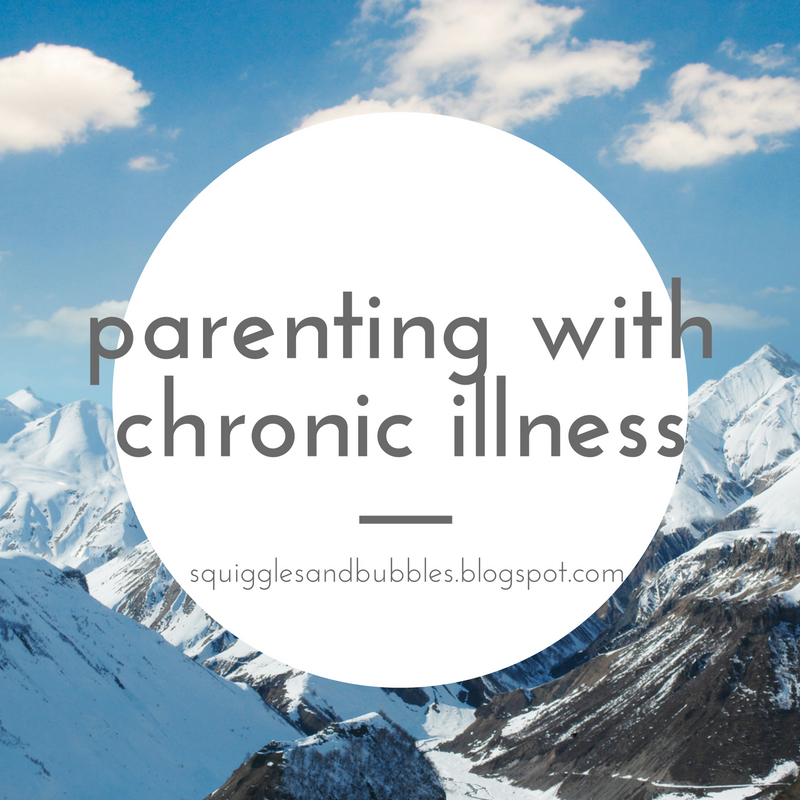Hi! Mummy A from Squishels and Me here again, and I'm happy to be continuing my series Parenting with Chronic Illness
with you. Last month I shared with you my birth story, this month I want to share my experience in the Mother and Family Unit.
Those four
days in the hospital were bad, but not as bad as what was to come.
I had daily
psych reviews during them, and it was decided by the third day that I was to
move to the mother and family unit after discharge from the hospital. So four
days passed, and four nights, and finally I got to feel the rain and wind in
the short travel to the offsite unit that would become our home for three
weeks, minus weekends.
The mother
and family unit was really nice.
We’d stay
there Monday-Friday in a lovely spacious double-bed room. The living area was
really nice, with access to Netflix and lots of toys and books.
There were
groups twice a day, depending on how our babies were going. The first week
there were two other mums with their babies; the other 2 weeks we were there
alone. The staff were really nice, always trying to help with everything.
My
disassociation soon gave way to a deep depression. All I wanted was to lie in
bed with my husband forever, and not have this nightmare baby demanding my
attention all the time. By the second review with the psychiatrist (he came to
the unit every Tuesday), I was almost begging him for antidepressants (he was
hesitant because of the ‘baby blues’ and other temporary hormone changes).
I started
on sertraline that week, and slowly my mood improved. I was able to go home the
following Friday, and actually feel semi-confident going home. I had learnt how
to feed my baby whilst in public, and I had started to bond with my baby and
feel like she was mine. In most essences of the word, I was ‘ok’.
I wouldn’t
pass up my time at the mother and family unit for anything. It was the best
transition into motherhood I could have hoped for.
Being able
to escape a screaming monster to watch Netflix for half an hour, and so many
other things helped give me the space I needed.
It taught
me how to keep on parenting when my mood wouldn’t let me, and how to bond with
this alien that had just ripped me open.
Sure, it
was annoying that they wouldn’t (weren’t allowed to) accept that my baby needed
constant connection and needed to bedshare (seems she managed to get my
nightmare problems). And sometimes the staff were over-the-top and just plain
irritating. But it was the best decision I could’ve made, for myself and my
family.
Thankfully,
I had already discussed moving to the mother and family unit prior to the
birth, so I was able to get a little bit of an understanding (although the
extent of my understanding was 'my baby won't be taken away from me if I have a
psychotic break'). I read on "Action on Postpartum Psychosis" some positive
recommendations about going in, but I really had no clue. I didn't know my
partner could stay, and I didn't know what a 'Monday to Friday ward' meant. The
youth mental health team through my public hospital came and visited me every
day whilst I was in the hospital, and they were able to answer some of the
questions I had. Mostly, it was just an experience I had to fall headfirst into
to find out how therapeutic and vital it would be to helping my health and my
bond with my baby.
You may also like Parenting with Chronic Illness: The Birth. Just click the picture to read all about it!
The medical information on this site is provided as a personal anecdote
only, and is not to be used or relied on for any diagnostic or
treatment purposes. This information is not intended to be patient
education, and
should not be used as a substitute for professional diagnosis and
treatment.If you need perinatal mental health supports in an emergency,
call your local hospital or E.D. (000). They're typically the best
supports to help you along the way in an emergency. Alternatively,
Beyond Blue (www.beyondblue.org.au; 1300 22 4636), P.A.N.D.A.
(http://www.panda.org.au; 1300 726 306) or even Lifeline
(https://www.lifeline.org.au, 13 11 14).



No comments:
Post a Comment